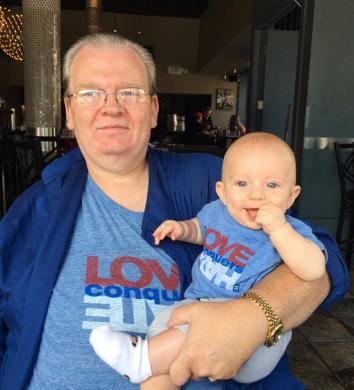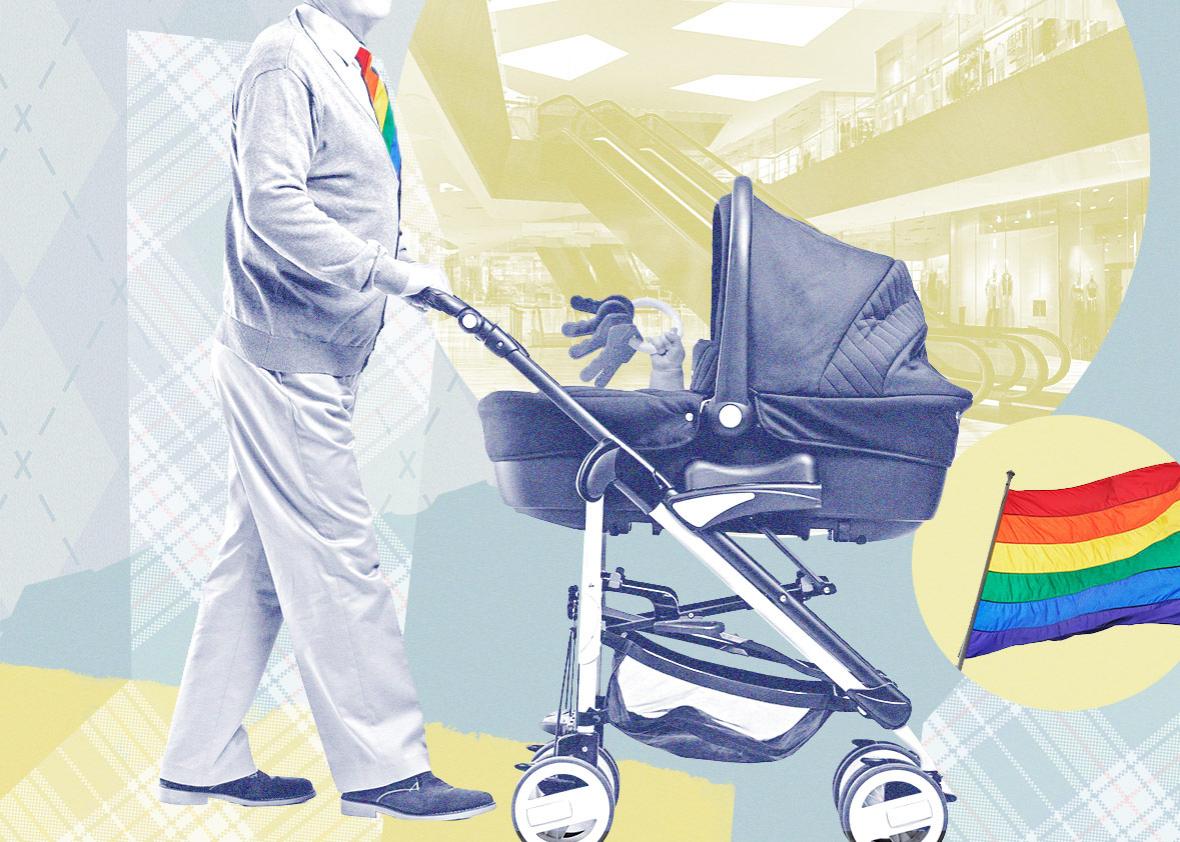My father was visiting us from Dallas. Keith—my husband—and I took him out to eat at the one upscale-ish restaurant in our new suburban Los Angeles neighborhood. It’s a Hawaiian-themed place with lots of fish dinners and droopy pink flowers floating in cocktails. During dessert, my dad, his glasses halfway down his nose, looked us in the eye and, with all the charm of Meryl Streep in the role of a Southern grandma, said, “I cannot wait to move here. I’ll watch your baby every day so you two can work and go on dates. I’ll be your full-time manny.” Then he chuckled at his cleverness for using the slangy word manny.
I nearly spit out the pineapply thing I was chewing. For most people, the idea of free child care is like a gigantic sack of “get out of jail free” cards. But I had tried for years to create healthy boundaries with my dad, and now he’d found the perfect way to blur them. He was inviting himself into our home and lives on a daily basis by suggesting that he’d be our child’s primary caregiver without so much as a conversation.
I had no words. I wasn’t even pregnant. Keith and I had just gotten married. And no, my father would not be trusted with the care of our firstborn. On the drive home, I told Keith, “Don’t worry. I will never let that happen.”
My father is incredibly lovable. He is a big and tall man whose presence says, “You can hug me if you wanna.” After meeting him or even just seeing a photo, people have confessed, “I want to hug your father.” He is like a puppy you cannot help but adore, but for me, he was also a puppy that peed on my carpet one too many times. (He even had a dog that peed on our actual carpet in our new house.)
When I was little, I loved my dad so much we made an agreement to live together forever. I asked him, “But what will happen when I get married?”
He laughed and said, “I’ll live in your guest bedroom.”
My mother and father divorced when I was 11. My dad knew he was gay at age 16, but he did what he thought he was supposed to: He married a woman and had children. Coming out is typically marked as a celebration, but for some families, like mine, it is a trauma lasting years, as conflicts recur around trust, forgiveness, acceptance, and the ability to sit in the same room with family members for more than five minutes.
Before my father’s coming out, I saw him as a divided man. Most days he was “funny and happy” Daddy, who enjoyed telling off-color jokes and playing with my hair. On darker days, he was “angry and lost” Daddy. He drank. He yelled. He left the house in fits of rage. When I was 10 years old, after I walked in on a fight he was having with my mother, he said to me, “I don’t love you.”
I brushed it off as a momentary episode of “angry and lost” Daddy possessing the body of his better self. Later that evening he was back to putting me on a pedestal and playing with my hair. All was forgiven, forgotten, and moved on with.
I was his best friend and confidante, which could be both a privilege and a burden. Before he came out, he told me secrets like what he got my mom for Christmas; after, he told me how he felt about his boyfriend, his family’s lack of acceptance, and how some mornings he didn’t want to wake up. Once he could live openly as a gay man, his anger dissipated, but it also uncovered a well of emotions he had suppressed for years. He was like a baby, vulnerable and weak in a new world. I was honored to be the one there for him, but it changed the nature of our relationship—making me feel more like the parent and him the child.
My emotional life never had the same weight and urgency as his did. He was a gay man in a society that did not approve of his sexuality. He was navigating a new life at age 36. He was raising a teenage girl—hard enough on its own, but most gay men were not fathers. I was a girl with her entire life ahead, and he was trying to catch up to the one that passed him by.
After graduating from high school, I wanted to be more independent of my father. This only caused fights; and at the time, he and his partner of seven years were also having problems. After a particularly intense week, I left the house to stay with a friend. When I returned, my key did not work. A week later I found out my dad moved to Florida. The man who was my best friend left without saying goodbye. The man who was my father threw away my bed and all my clothes.
Six months later I called him. It killed me to wait, but it also killed me to make the first move. On the phone, we spoke as if nothing happened.
“You must come to Florida for Christmas,” my dad said.
“Of course,” I said.
I thought I could handle maintaining a relationship as long as he lived in another city. Throughout my 20s, my father listened for hours over the phone as I whined about my crappy jobs and crappier love life. “Don’t worry,” he would say, “it will all work out. I know it.” Not only did he emotionally support me, but he also supplied me with tons of amazing household goods. He was the manager of a Tuesday Morning store, so with his discount, he blessed me with a KitchenAid, high-thread-count sheets, exotic lamps, and top-of-the-line cookware. He tried to make up for all the things he threw away, including my trust, but I still held a grudge.
Visits were hard. I wanted badly to pull him in and hug him but also to push him away and make him feel the pain he caused when he abandoned me. His presence irritated me. I had to correct him on everything. If he said something was purple, I had to say, “No, it’s blue—the tag says right here.”
Whenever we said our goodbyes, I cried: because I knew I’d miss him but also because I was sad that I wasted all of our time feeling angry. For over a decade, he was there for me, but I could not forgive, forget, and move on.
When I told my dad that Keith and I were trying to have a baby, he moved to Los Angeles the following month. Keith said, “That’ll be nice to have your dad so close.”
“It’s not like he can watch the baby,” I said.
“Why not? You turned out OK, right?”
“Barely.”
The plan was that I’d stay at home with the baby. But he was colicky, his screams like a constant alarm signaling a fire I could not put out. Exhausted and helpless, I decided I could not watch the baby alone. We discussed hiring a nanny, but we needed someone who was temporary, part-time, flexible, and inexpensive. After much thought, these words came out of my mouth, “Maybe my dad could help.” All I needed was someone to hold the baby for a few hours so I could sleep, eat, and pee.
When I asked my dad if he’d like the job, he said, “Of course.”

Elizabeth Collins
He was playing it cool. He has dreamed of being a grandpa ever since I was 5. The minute I stopped being a baby, he wanted another one. Babies don’t have memories. Babies can’t hold grudges.
On my father’s first day of work, he showed up early. He stood over me and said, “Give me that baby.”
I gladly forked him over. The air shifted. We were on new ground—level ground. There wasn’t room for me to be petty about little things. My dad let go of his defenses, the ones he created in response to me being mean to him for so many years. He stopped painting me as the self-righteous and impossible daughter, because I stopped being one.
A year later, my dad is still our grandmanny. Every morning when he walks in the door, our son, Axel, runs to greet him. They eat breakfast together, and Axel takes his morning nap nestled on my father’s chest. When he wakes, they go to the mall for a walk, and at noon, my father hands the baby back with a smile.
“It’s funny the looks I get at the mall,” he told me. “I guess you don’t see a lot of old men with babies.”
I know he loves the attention. Nothing gives my father more pride than being a grandfather, being good at it, and getting to do it every day.
In the first few weeks after my son was born, I could see the hardness of parenthood: how it tests you, how it could make you feel or do things you regret. I am at my best as a mother when I feel whole. My father had to fight for decades for wholeness. I never felt the need to forgive my father for being gay. But I did have to forgive him for not coming out with grace and all the growing pains that ensued. As a parent, I can now see how hard it is to do anything with grace, let alone something so monumental.
